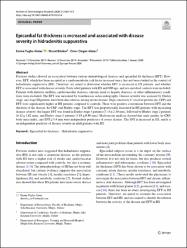Epicardial fat thickness is increased and associated with disease severity in hidradenitis suppurativa
Özet
Previous studies showed an association between various dermatological diseases and epicardial fat thickness (EFT). However, EFT, which has been accepted as a cardiometabolic risk factor in recent years, has not been studied in the context of hidradenitis suppurativa (HS). Therefore, we aimed to determine whether EFT is increased in HS patients, and whether EFT is associated with disease severity. Forty adult patients with HS and 100 age- and sex-matched controls were included. Patients with diabetes mellitus, cardiovascular diseases, chronic renal or hepatic diseases, or other inflammatory conditions were excluded. The EFT was measured by transthoracic echocardiography. Disease severity was assessed by Hurley stage, and stage III patients have been described as having severe disease. High-sensitivity C-reactive protein (hs-CRP) and EFT were significantly higher in HS patients compared to controls. There were positive correlations between EFT and the duration of the disease, hs-CRP, and Hurley stage. The EFT was proportionally increased in HS patients with increasing disease severity; the largest EFT was found in Hurley stage 3 patients (7.34 +/- 2.30 mm), followed by Hurley stage 2 patients (6.12 +/- 1.82 mm), and Hurley stage 1 patients (4.83 +/- 0.98 mm). Multivariate analysis showed that male gender, hs-CRP, body mass index, and EFT >= 5.9 mm were independent predictors of severe disease. The EFT is increased in HS, and it is an independent predictor of disease severity in adult patients with HS.


















